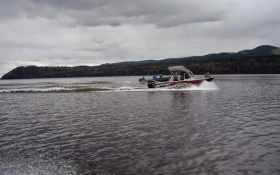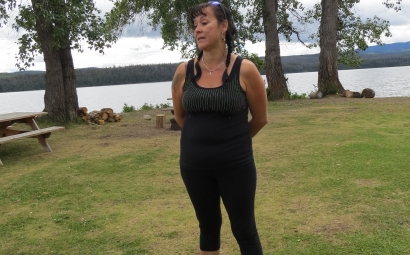About Treaty
Treaty negotiations are a complex and long process that deals with a wide assortment of issues. At the Lake Babine Nation Treaty Office we perform a variety of duties related to negotiation, community engagement, and various types of research.
Negotiations require that we make sure that we are well-informed about what other groups have tried to do in their agreements with the government and that we evaluate those approaches for how useful they might be to LBN. Where a good approach has been found, we can use the elements of it that work for LBN as a framework for negotiations. Where there is nothing that fits LBN we have to come up with a new model. Another part of negotiations is trying to figure out ways that some of the benefits of treaty can be seen by the members or tested by LBN before treaty is signed.
Community engagement is a really important part of the Treaty Office’s duties. Treaty is about what the community wants for the future. The treaty staff put a lot of effort into communicating with the membership about what is going on in treaty and what the results might be. We try and get feedback and direction from the community on specific topics and use that feedback to guide our negotiating stance at the table. We also try and use community feedback to decide what topics are most important to negotiate on first and which area we should try and get something in place before the treaty is signed. Unfortunately, this can happen with only a small number of the subjects in the treaty so we need to try and figure out the ones are the most important to the community.
Research is also a big part of what the treaty office does. There are several types of research that the treaty office works on. One is collecting documents and information on the genealogy (family trees) of LBN members. This includes information from interviews and from archives and other documents. There are also researchers in the office that work on collecting traditional use information. This is about how LBN members use the land. This sort of information is really important in negotiations with companies that want to develop LBN territory. It helps LBN negotiate from a position of strength.
Welcome to Treaty
The first thing to understand about treaty is that it is a process that takes a long time to do correctly. This means that most of the benefits of treaty will be seen by the youth of today rather than those who are older and working on the treaty right now. Treaty is about the future rather than the present.
Treaty Process
The Treaty Process has 6 stages. LBN is at stage 4.
Statement of Intent Map
View the Lake Babine Nation Statement of Intent Boundary Map.
Specific Claims
Review some of the Specific Claims.
FAQs
Review the most frequenty asked questions regarding the Treaty Process.
I will be adding at least one new FAQ per week under the head line What is a Treaty?
Memorandum of Understanding
Between UNBC and LBN
Purpose
The purpose of this MOU is to describe and build a foundation for how the Lake Babine First Nation and the University of Northern British Columbia (UNBC) can work together for a cooperative, long-lasting, and mutually beneficial relationship.
Treaty Myths
There are a lot of rumors, myths, and misconceptions about modern day Treaties. Here you will find some of the common myths that are out there today, followed by the truth.





